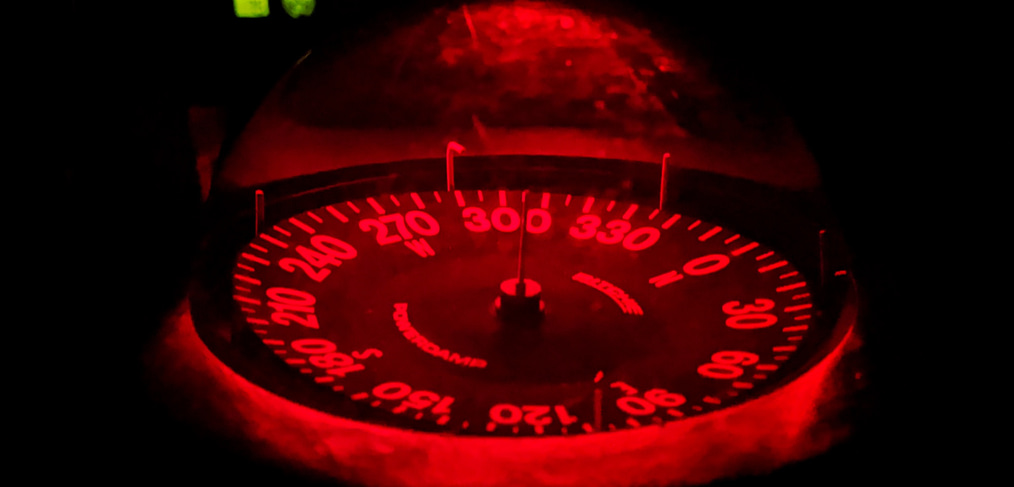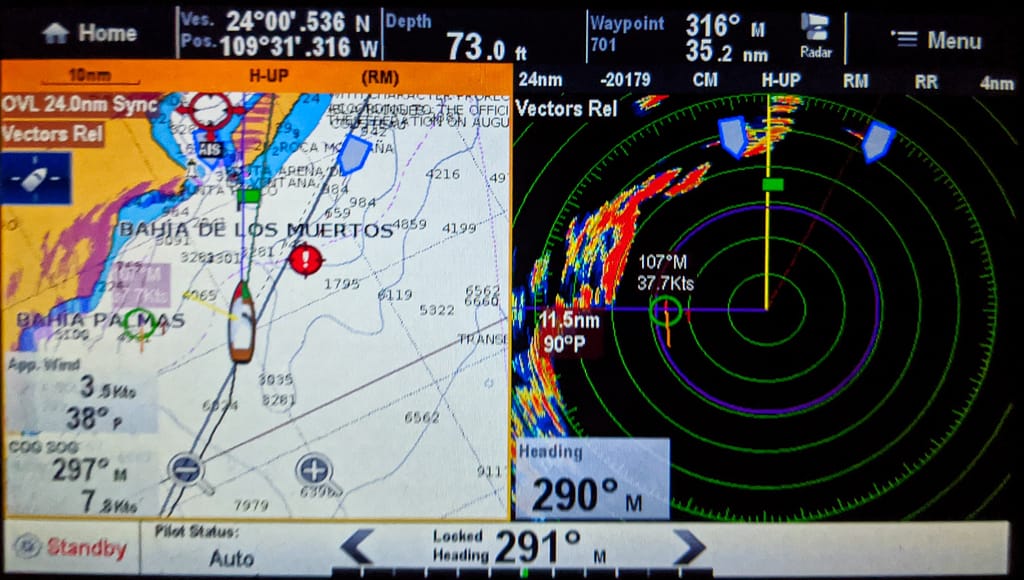
Do we anchor at night?
One of the recurring question we get when we’re talking about being in passage – that is sailing more than 24 hours without stopping – is exactly that: how do we stop? Surely, there must be something clever that allows us to stop the boat at night.
Maybe we have some sort of magical bag that allows us to get the 27 000′ of chain needed to anchor in the open ocean? Or maybe a collapsible wall that would block the wind and waves so we can have a good night of sleep? Even though both sound ridiculous even to the non-sailor, the clever system we employ is clearly of some interest, as everyone wants to know what type of brillant contraption human kind invented to stay at sea.
Staying awake
Yup. That’s what humankind came up with. I’m kidding. Humans came up with something much clever; captains. Captains are wise and know everything. They also command respect and deference. So OTHER people are staying awake, allowing the captain to sleep. But for all the non-captain out there, it doesn’t change a thing; staying awake is the solution. What does it mean? Well, pretty much that as soon as the sun is starting to set, we start standing watches officially. One of us will go down below and tuck the kids in bed, then go catch on some sleep while the other one will stay in the cockpit and glue his eyes on the horizon.
Standing watch
So what does that mean exactly? It means just that; to watch. Electronics came a long way in the last 30 years and it’s true also on a boat. Pablo has similar electronic equipments that you would find on a super tanker, making our watch much more efficient than trying to see another boat’s running light in the disance. Right in the cockpit, we have a display that combines electronic charts and GPS, allowing us to know where we are in real time so we don’t run aground (assuming the charts are accurate…). On top of the charts will overlay our AIS, a bit of technology that uses the VHF antenna to broadcast our position, speed, bearing and so forth to all the ships and the area. It will also collect the same info from the other ships. The computer will then analyse everything and display all the other ships on the map in relationship with us, highlighting the chances of us bumping into somebody else. It’s really an amazing piece of technology, but one that not everybody has du to its cost. So although all the big ships have it by law, lots of smaller folks aren’t that lucky. Or turn it off, like all those fishing boat that are emptying marine reserve at night… Which brings us to the radar, that allows us to see everything; being a ship without AIS, an island not on a map or more importantly, a storm! Radar can pick up rain, allowing us to zigzag between thunderstorms, and the high winds and lightnings that they bring.

Isn’t that incredible? And on top of that, we can set alarm on AIS and radar, automatically alerting us if anything comes up our way in a radius of X miles AND have it displayed downstair at the chart table while the autopilot (we called him James) steer the boat for us. So really, standing watch isn’t so bad, right?
Well, yes and no. Although all of that technology is amazing, an accident at see would have some disastrous consequences. And ‘disastrous consequences’ isn’t an euphemism here, we’re talking death. Mainly ours. So do we leave it all to some electronic that are subjected to salt water and the constant motion of the boat slamming into the seas? Nope. So watching our electronics is only a portion of what we do. We certainly appreciate all of it, but there’s still a good part that is dedicated to scanning the horizon, trying to spot a tiny light in a sea of darkness.
Half of watching is really about listening
There is a lot of moving parts on a boat like Pablo, so a lot of tiny noises that only him do. Over the years, we’ve grown to know every one of them. Half asleep in my bed, I can know if a sail isn’t trimmed well enough, or if the engine should be ran a 100 rpms lower to save a bit more fuel.. So we listen as well for any new sound that would indicate that something changed. And if there’s changes, there’s a good chance it is for the worst. A block that starts squeaking means failure at the worst moment. And engine that slow down just for a moment means a fuel filter that is clogging. All things you want to spot and address as soon as you can. Or listening for boats! Because even with all the electronic and us standing watch, sometimes you won’t see a boat but you can hear it. Like the navy that sneaked up on us at midnight of the coast of Panama. They came in a fast RIB, with no light and all dressed up in black, from behind. No way we could have seen them, but we heard them
Watch schedule
Scanning the horizon is like watching a fire; you can do it for hours. Looking at the waves, the bioluminescence, the stars, the sunset and sunrise. Night watch can be really fun. But no matter how much we cherish them, there’s no way we can stay awake 24/7. So, like every other boat in the world, we do watch schedule. Ours became progressively looser with the time and now ressemble to something like that:
- 18h00 to 23h00
I’m standing watch officially. I’ll prep the boat for the night (reduce our sail plan, do a quick rig check for bad surprises that would creep on us during the night, check fuel filters, reel back the fishing lines, etc). Cass will read stories with the kids and put them to bed, then go for sleep herself. - 23h00 to 1h00
Cass stands watch while I catch up on sleep - 1h00 to 5h00
I’m back in the cockpit while Cass is sleeping

- 5h00 to 10h00
Cass watches the sunrise and then take care of fixing breakfast for the kids while I try to sleep as long as possible. - 10h00 to 11h00
By 10, I’m usually awake. We’ll assess together the progress of the night and quickly update our navigation plan accordingly. I’ll drink like 9 cups of coffee and redo a quick rig/boat check. Cass will tell me how beautiful how the sunrise was and I’ll try to beat her by saying how beautiful the moonrise was (yes, it’s a thing!). - 11h00 to 13h00
Most of the them, Cass will try to catch up some rest down below. I’ll play with kids (usually trivia type questions (either history questions to keep school going a bit or silly questions like “Would you rather be a dolphin or a frigate bird?”)) and fix launch. - 13h00 to 18h00
Boat cleanup, making dinner, laundry and etc. I’ll fix what need to be fixed that wasn’t urgent and so will fix dinner as well. Food is the one thing everyone is looking for in the day on passage, so I try to come up with crowd pleasers every night
More broadly, between 10h00 to 18h00, we’re both responsible to stand watch. A key aspect of a successful passage is to keep life going as normally as possible. You don’t want to just be waiting for it to be over! So although we skip school most of the time, there’s a lot of family time, playing lego and drawing or dressing up. And we just cannot skip laundry, dishes, cooking and boat repair. All of that involves going inside, being focus on kids and so on. So we achieve that by communication. Just like you do with a very young kid really; we tell each other every time we go down below or cannot scan the horizon for more than a few minutes.
Something doesn’t add up, right?
I hear you right there! “Hold on Sam, I thought you said captains don’t stand watch? Aren’t you the captain?” Yes I am. Or at least, that’s what I tell Cass every time she comes in the middle of the night to wake me up. I guess we’ve been married for too long now; that doesn’t impress her one little bit! So really, nothing to gain by being the captain here, and a whole lot to loose. Mainly sleep, which is more precious than gold on passage! Being the captain means to always be available when something breaks, or when a decision needs to be taken. There’s been some nights were I managed to got a mere one hour of sleep because of breakdown or we needed dodge our way through shipping lane. Or because I’m a dad on top of that, and the kids decided to start a pillow fight and Cass cannot spend half an hour down below to try to calm the crew. I guess that’s just what it is!





Emeğinize sağlık, bilgilendirmeler için teşekkür ederim.
IPTV Premium’s content library is impressive. There’s something for everyone, from movies to series to live sports!